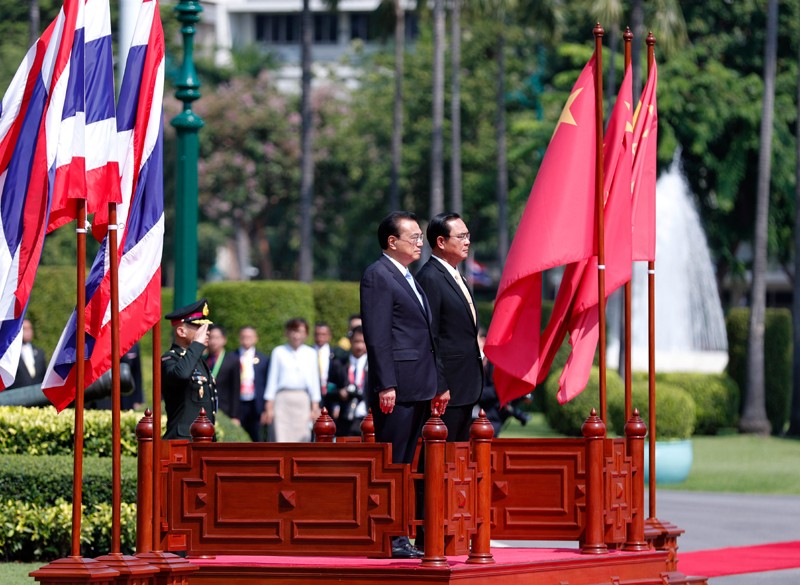Business
China is Now Thailand’s Top Source of Foreign Investment
For more than five decades, Japan was the largest investor in the southeast Asian nation, but a number of factors conspired to knock it off the top spot

China topped the list of economies looking to invest in Thailand for the first time last year. Overtaking Japan
as the southeast Asian nation’s main source of foreign direct investment. Above all thanks to belt and road-linked projects, over spill from the US-China trade war and Thai government incentives.
Applications from China – valued at 262 billion baht (US$8.5 billion). They accounted for more than half of all foreign direct investment applications, according to Thailand’s Board of Investment. Japan’s applications, meanwhile, were valued at 73.1 billion baht. Followed by 36.3 billion baht of applications from Hong Kong.
High-Speed Rail Project in Thailand
However, the vast majority of Chinese investment agreed upon last year was linked to a 224 billion baht high-speed rail project. It will connect the airports at Suvarnabhumi, Don Muang and U-tapao. Contracts for the project were signed in October, between the Thai government and a consortium. Whose members also include the Chinese state-owned China Railway Construction Corporation.
Siwat Luangsomboon, an analyst at Kasikorn Research Centre, noted that such major infrastructure projects would “not happen every year” and that before the deal was signed, Japanese investment had actually exceeded that from China in the first nine months of 2019.
Japan has been the largest investor in Thailand for more than five decades. Its investments have subsequently “matured”, according to Pavida Pananond, a lecturer at Thammasat Business School in Bangkok. Chinese investment, meanwhile, is at a relatively “early stage of development.” So there “likely to record a faster growth rate and larger initial flows”, she said.
“While annual flows of Chinese investment may exceed that of Japan this year. Thanks partly to the relocation of Chinese firms hit by the trade war with the US. Also incoming Chinese investment related to the high-speed train projects. It will take a while for accumulated Chinese investment to exceed that from Japan,” she added.
Thailand handing out big tax incentives
China has sought to invest in a number of sectors promoted by the Thai government. Such as cars, smart electronics, biotechnology, logistics and aviation. Attracted by tax rebates and deductions, preferential visa policies and “a lot of deregulation”, Kobsak Pootrakul, secretary to Thailand’s Council of Economic Ministers, told a press briefing earlier this month.
These revised investment incentives were rolled out following a year of currency appreciation, weaker exports, fewer tourist arrivals and lower agricultural prices, which have conspired to send Thailand’s growth forecasts tumbling to among the lowest in the region, at less than 3 per cent.
Thailand also struggles to stay competitive when compared to other regional players such as Vietnam
, despite its “better infrastructure, ecosystem for foreign investment, and depth of supply chain networks in key industries like electronics and automotive”, Pavida, the business professor, said.
Kriangkrai Tiannukul, vice-chairman of the Federation of Thai Industries, predicted a slow recovery for Thailand’s economy given the current global economic slowdown, ongoing geopolitical and trade tensions and a recent severe drought that has affected agricultural productivity and farmers’ incomes.
Increased China investment in the years ahead
“I think we will see the Chinese coming ahead as Thailand’s biggest investors in the future,” he said. “Ultimately the value of their investments will surpass that of the Japanese.”
In addition to the high-speed railway linking three airports, infrastructure projects being rolled out by the Thai government that could attract further Chinese investment include some 2,000km of single-track railway that is set to be doubled, planned increases to airport capacity and an expansion of Bangkok’s mass transit network.
The so-called Eastern Economic Corridor, a 1.7-trillion baht mega project heavily reliant on Chinese backing that seeks to replicate a similarly name investment programme from the 1980s, is also expected to continue attracting investment.
These opportunities, when combined with the policies being implemented to strengthen the country’s economy. Small and medium-sized enterprise segment, agricultural sector, export competitiveness and tourism industry. Will make “this is the best time for companies to invest in Thailand,” said Kobsak, the government secretary.
Source: SCMP






























